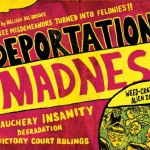We Have Met the Other and He Is Us (Law Professors)
 In the latest development in what is starting to feel like a trip “through the looking glass” to some bizarre version of the legal world as I understood it in law school, actual, important politicians have raised the spectre of repealing or amending or re-interpreting the Fourteenth Amendment, specifically, its provision that “[a]ll persons born or naturalized in the United States, and subject to the jurisdiction thereof, are citizens of the United States and of the state wherein they reside.” It seems especially sad that those who want to abolish or change the long-standing, post-Civil-War principle of birthright citizenship in the United States are, mainly, Republicans: one might call the Fourteenth Amendment “one of the [Republican] party’s greatest feats,” as did the Economist in the article linked above. In any event, the Economist article does a pretty fair job, I think, of discussing the various perspectives on the issue (including pointing out that the so-called “anchor baby” idea is almost completely a fallacy, since a child cannot petition to make his parent a citizen until after the child is 21).
In the latest development in what is starting to feel like a trip “through the looking glass” to some bizarre version of the legal world as I understood it in law school, actual, important politicians have raised the spectre of repealing or amending or re-interpreting the Fourteenth Amendment, specifically, its provision that “[a]ll persons born or naturalized in the United States, and subject to the jurisdiction thereof, are citizens of the United States and of the state wherein they reside.” It seems especially sad that those who want to abolish or change the long-standing, post-Civil-War principle of birthright citizenship in the United States are, mainly, Republicans: one might call the Fourteenth Amendment “one of the [Republican] party’s greatest feats,” as did the Economist in the article linked above. In any event, the Economist article does a pretty fair job, I think, of discussing the various perspectives on the issue (including pointing out that the so-called “anchor baby” idea is almost completely a fallacy, since a child cannot petition to make his parent a citizen until after the child is 21).

